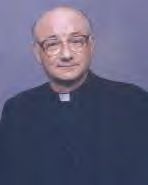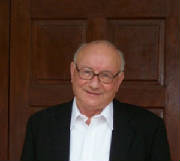The first
two years of the war weren’t that bad for my family economically speaking, but of course, much was shielded from me,
an eight year old. We didn’t have much, but we got along. There was an enormous amount of hunger in the city though.
I remember seeing the poor women coming from the city with hand-drawn carts going door to door, begging for something to eat.
My mother would always put out a big basket of potatoes for these people. She would give 6 or 8 potatoes to the first person,
then 6 or 8 to the next, and so on. It was similar to today’s Halloween in the United States, but when the basket of
potatoes was gone for the day, there was no more. I was the ninth of ten children, born one and a half months after my older
brother Leo died; therefore, in his memory my parents named me after him. The same is true of my youngest sister who is named
in memory of an older sister who died. We always kidded our parents that we were just ‘replacements’ for the first
two.
Our family owned about 40 acres of sandy soil on the coast of
the North Sea in Noordwijkerhout in the northern part of Holland. Father was a tulip farmer, and we children would help him
do the work of planting, snipping, and digging. The girls had their chores, and we boys had ours. Father would put the flower
bulbs on the market, and buyers would export them all over the world. Once the war started, all orders became impossible to
deliver. Since there was no market for flowers, my father immediately began planting vegetables. Though our rural village
of Noordwijkerhout was not heavily bombarded like the cities of Rotterdam and Amsterdam, we were in a strategic location between
Germany and the North Sea. The Germans built bunkers in the sand dunes that paralleled the sea and our homes along the road.
The war did not stop our attending school. My brother, six sisters, and I walked past these bunkers four times each day in
our traditional wooden shoes, which we filled with straw in the wintertime to help keep our feet warm. It took us a half hour
to walk to our parochial school. We would walk back home for lunch, then back to school, and finally arrive home at 5 P.M.
It was a very long day compared to today’s American students. Actually, it might surprise some that I wasn’t all
that good in church, which we attended each morning. Of course, the teacher would put me in the middle aisle on my knees during
Mass if I misbehaved, and I'd be in double trouble because my sisters were there to see and report everything to my mother.
I had to bribe my sisters about my behavior in church. We had homework at night, but usually there was no electricity during
the war. Though we had kerosene lamps, my brother and I would do our homework by bicycle-generated power. I would put a bicycle
on a stand and pedal fast enough to generate light for him while he did his homework. Then he would get on the bike and do
the same for me. I was always very anxious for him to hurry and finish.
During the later part of the war, the Germans developed a policy of forcing Dutch families to vacate every
other house in our village so they could have private quarters. Those who had lived in their homes just had to find another
place to live. I guess when they saw our huge family they thought twice about our relocation. So, for the last six months
of the war we lived between two houses occupied by Germans. Having so many older sisters, I remember the German soldiers who
lived next door would bribe me with chocolate to get them a date with one of my sisters. They tried very hard, but my mother
was very strict. She said many prayers to make sure things would be all right, and she made sure we prayed, too. Each night
we all said the rosary together in the dark. My mother would always want to add ten extra Hail
Mary’s for “those soldiers killed today,” another ten for “the poor and hungry.” My older sisters
would become very annoyed when mother would add these extra Hail Mary’s and ask, “Why can’t we just dedicate
the prayers we’ve already said to these people?” Finally, mother relented. Living
next door to Germans inspired us kids to play war games. My friends and I played ‘soldier’ and often ‘waged
war.’ We used sticks for guns. I could get rather rough and defend myself pretty well.
My father was what you might call in today’s world the vice-mayor of the town. He became a member
of the Dutch Resistance (DR). The DR helped hide Jewish people and did whatever it could to make the German occupation as
uncomfortable as possible for our enemy. If my father or any other member of the DR were caught, he could have easily been
sent to the concentration camp. I knew my mother was frightened at the time, but I didn’t learn until the war was over
that my father was a member of the DR.
Trading was very important because
there was nothing in the stores to buy, only empty shelves. Money had no value. Of course, there was the black market, but
you didn’t dare do anything in public. Father would trade a lot in the beginning, especially with the dairy farmers;
however, the last year of the war, there was nothing left to trade. That last part of the war was called the “Hunger
Winter.” Even though much of Western Europe had been liberated from Nazis control, Holland remained under their firm
grip. I remember the hunger. We were forced to eat tulip bulbs and sugar beets because there was no other food. Bread made
from tulips is not very good; I can tell you that! The skin of the bulb is removed, pretty much like an onion, and so is the
center, because that is poisonous. Then it is dried and baked in the oven. My mother or older sisters would grind the bulbs
to a meal-like consistency. Then they would mix the meal with water and salt, shape it like a meatloaf, and bake it. I can
still remember the taste of it: like wet sawdust. Sugar beets were usually thrown to the hogs, but that winter we ate them,
too. We still shared tulip bulbs and sugar beets with those with hand-drawn carts who continued to go from door to door. I
think seeing my mother still give to the hungry at this time, even though we had very little, made me want to be a missionary:
to help people, especially in China or the Philippines who were a lot worse off than we were.
During this “Hunger Winter,” Canadian and American pilots dropped food packages from the
air to help relieve the hunger of the Dutch people, but many of these packages were confiscated by the German soldiers who
occupied every other home in our community. They were also very hungry. I have a great love for the American and Canadian
soldiers who liberated Holland. We were invaded in 1940, by Hitler and not liberated until May of 1945; that is 5 years of
Nazi-occupation! I remember that joyful day of liberation vividly: The American and Canadian soldiers drove big tanks and
jeeps victoriously into our village, throwing candy bars and chewing gum into the crowd. I could see the American flag waving.
The tulips were totally in bloom because it was May; it was so beautiful. My mother dressed my younger sister in her first
communion dress, and my father gave her a bouquet of red tulips. She walked right up to a jeep, and the American soldier picked
her up and put her on top of the steering wheel. It was a very emotional day.
After the war, Holland and the rest of Europe slowly recovered thanks to the Marshall Plan. My father’s
tulip business improved, too. I headed off to the seminary in September of 1946, and was ordained at the age of 23 in 1958.
The year I was ordained four of us were sent to the United States for “in house training” in philosophy at Catholic
University in Washington, D.C. In class I could hardly understand what was being said, let alone take notes. I asked a nun
in my class if I gave her carbon paper would she take notes for me, too. She agreed; she took great notes, and I got to listen
totally. I assisted at various parishes in northern Virginia, taught math at a Catholic School, and was invited to teach philosophy
at Catholic University.
In 1969, I was elected Provincial
of Missionhurst’s 110 parishes throughout the United States. That meant I did a lot of traveling. I held that post for
10 years. When I stepped down, the new Provincial wanted me to stay near Arlington. At the same time Father Maurice duCastillion
here in Culpeper wanted to move to a smaller house in Little Washington, and, as Paul Harvey would say: “Now you know
the rest of the story!” I think quite a few people in our parish thought I would come, build a new church, and leave.
Well, I have been here for 25 years, and it has been wonderful. I didn’t become a missionary in China or the Philippines,
but God had better plans for me.
| 


